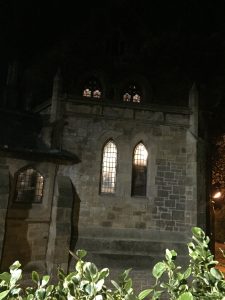DULOG’s Spring Awakening explores the lives of twelve restless youths as they learn to navigate their sexuality and responsibility. They are forced to grow up independently, without adult guidance, whilst losing their innocence in the process. It is a poignant and thought-provoking musical, unashamedly presenting the difficulties of growing up.
As a musical about rebellion, the plot is complicated due to the heavy emphasis on religion and authority. DULOG’s setting of Hild Bede’s Joachim Room complements this contradiction: the intimacy is conveyed through the small stage with the audience sitting around it. Due to the audience’s proximity to the cast, it feels as though the audience are growing with the characters. DULOG also capitalise on the intensity of the space. This is particularly noteworthy with the placement of Emily Hardy and Owen Kennedy, who are back to back during their role as teachers. Their positions emphasise the sinister nature of the pair, and is supported by the atmospheric lighting.
The most effective feature of the musical is its choreography. The reprise of ‘Mama Who Bore Me’ is especially strong, as is ‘Totally Fucked’. For the latter, the ensemble are impressively energetic and convey the recklessness of the piece very well. Also, the ensemble’s imitation of Sam Baumal’s Melchior Gabor whipping Rosie Dart’s Wendla Bergman is powerful, and certainly reflects the emotion of the scene.
The music in the show is also exceptional: DULOG definitely showcase the excellent soundtrack of Spring Awakening. A highlight of the show is how Charlie Nicholson’s Moritz Stiefel, Sam Baumal’s Melchior, and their classmates move seamlessly in and out of ‘The Bitch of Living.’ Here, the music and acting combine almost effortlessly. Of course, the music would not have been so impressive without the band, and their accompaniment of Wendla’s and Melchior’s duet towards the end of the musical is especially striking.
Occasionally, however, the singing is drowned out by the band. This compromises the emotion of some of the pieces, as well as the powerful voices of the cast. There are also a few technical issues during some of the songs, but the cast deal with the unwanted sounds well.
Sam Baumal as Melchior is especially strong: he commands the stage impressively when writing his notes for Charlie Nicholson’s Moritz, and creates an ambiguously moral character before having sex with Rosie Dart’s Wendla. It is interesting that DULOG choose to portray the show’s Off-Broadway run, where consent from Wendla is more ambiguous. In DULOG’s musical, Wendla does not give explicit verbal consent. This emphasises Melchior’s ambiguously predatory nature, which Sam Baumal enhances through his consistently intense gaze at Wendla.
The choice of costume is also persuasive, as the youths’ young ages are highlighted by their school uniform. With some actors wearing a school badge, the audience are forcefully reminded of the innocence that has mostly been lost by the end of the musical. The white dress and ribbon that Rosie Dart’s Wendla dresses in is also a painful symbol of Wendla’s naivety, and makes her tragic end even more moving.
Despite some technical issues, DULOG’s Spring Awakening is an excellent musical. The cast portray the emotional themes of the show with sensitivity, and bring an abundance of energy to their songs. They also effectively convey the intimacy and difficulties in growing up. It is a compelling musical that is unapologetically authentic.
DULOG’s Spring Awakening is on at 7:30pm, 14th-17th November, and at 2:30pm 17th November, in the Joachim Room, Hild Bede College.
